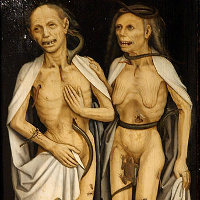The Halloween holiday has more of a traditional link to the undead than monsters in general, as we’ll focus on now. For the purpose of this discussion, we will define the undead as the deceased who have not departed the realm of human experience.
Really, for as long as we have recorded stories of any kind, and likely before any practice of recording, there have been stories of the restless dead. There may be many explanations for this, from quirks of the evolution of the human brain, to experience of what might remain of the sentience of the departed, to something else altogether. Some symptoms of the undead state have been traced to actually occurring biological traits of the living, like hemophagic tendencies displayed by some anemic individuals. Other things set off our sense of agency, as whatever it is that is disrupting parts of our brain function and health, triggers subconscious imagery in our brain.
I’ve noticed zombies are very popular recently. Zombies are typically depicted as the corporeal undead, and may be more common than we might think.
Death is defined as the ending of the organism’s life processes, and this process is complex and often not strictly linear. Apparently, it’s not uncommon for viruses to circumvent our natural life processes enough to bend, or theoretically completely control, our behavior.
An example of behavioral influence in humans would be heightened aggression in cases of rabies. Would you say that a virus, that accomplishes wide spread and perhaps permanent alteration of the host’s life processes, has left the host alive? The zombie powder toxin does selected damage to the human brain, more or less putting the person in a permanent dream like state and functioning as a chemical lobotomy, seriously reducing if not eliminating their free will.
The bite of a werewolf reminds me of a rabies infected person. Maybe that is where the stories come from? It seems rather likely. Add both viral influence with other factors that can cause atavism of human consciousness and make the mind regress to an animalistic like state. Literal lycanthropy may be false, but some form of lycanthropy might be real, though perhaps more correctly called therianthropy, meaning animal change rather than just wolf change.
But are lycans really undead? No. They would be a different phenomenon all together, with only the tendency to vicious or aggressive behavior held in common between them and some forms of undead.
Your thoughts are welcome. Be well friends.
Travis Saunders
Dragon Intuitive
~science,mysticism,spirituality~

